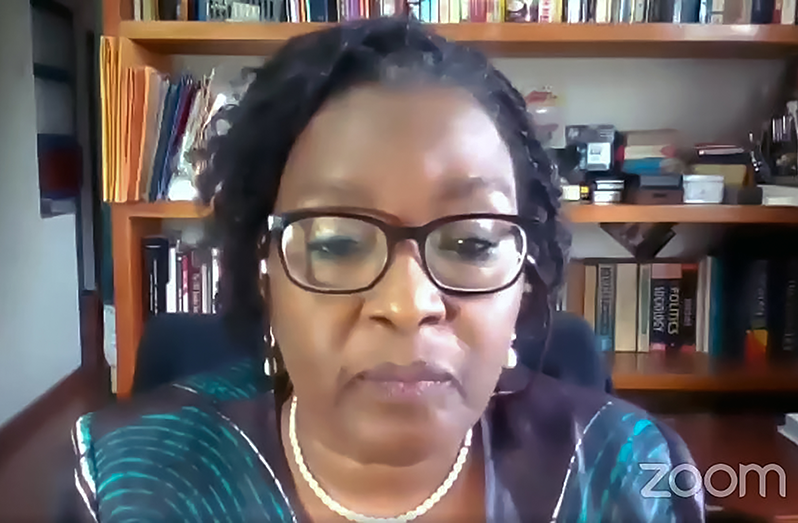By Vishani Ragobeer
THE University of the West Indies (UWI), St. Augustine Campus, zeroed in on the dynamics of race relations and reconciliation in Trinidad and Tobago through its post-election Virtual National Symposium held on August 30.
The Twin Island Republic held its General Election on August 10, 2020. The pre-election campaigning and the post-election reactions were fraught with racist overtones and tension, primarily between the two larger racial groups, the Indo and Afro-Trinidadians. These two groups also form the support base for the two larger political parties, which hold the monopoly of the electorate.
“Perhaps this country is at a crossroads in its race relations, or perhaps the ease of social media simply allowed this issue to be propagated,” related Dean of the Faculty of Law at the UWI, Professor Rose-Marie Belle Antoine. This, she highlighted, formed the impetus for the university’s forum, which was organised by the Law Faculty in collaboration with the Catholic Commission for Social Justice.
Importantly, she posited, “A university must be grounded in its community and it must provide a voice for important issues. It must facilitate discussion, as well as lead that discussion for public good.”
The symposium brought together several academics who have been immersed in the field of race and race relations, alongside other integral stakeholders. According to the Professor, it is clear that there are enduring structural issues which are conducive for the pervasion of these racial tensions but which must be interrogated in order to facilitate reconciliation. This symposium, she affirmed, was just the first step.
While speaking at this forum, Professor Emeritus, Rhoda Reddock, highlighted that the Afro/Indian binary replaced the black and white binary promulgated by colonisers during the post-Independence period. The antipathy which exists primarily between these two groups results from colonial power structure where, essentially, white was right.
“(Race) was a key organising principle of colonialism,” she said, explaining that it justified the near decimation of Indigenous people and the forced transportation and enslavement of Africans. This, therefore, meant that when the Indentured Indians and later, other groups such as the Middle Easterns and other Asians came to the Twin Island, they entered into an already “racialised, colour-coded, hierarchical social structure.”
VICTIMHOOD
This overarching system of white supremacy was the genesis of a myriad of dangerous and destructive stereotypes and myths that plague that multiracial country. This, she noted, positions the racial groups in competition with each other for “victimhood”; that is, they compete to ascertain who has suffered more, and who deserves more, who has been discriminated against more, and who is the current oppressor versus who is currently oppressed.
“Racialised contexts are difficult enough when hierarchies are clearly visible but where the groups concerned are relatively equally placed or equally displaced, as in many parts of the post-colonial world, the potential for conflict is much higher,” Professor Reddock said pointedly.
Meanwhile, Leader of the National Joint Action Committee (NJAC), Kwasi Mutema, posited that the tensions between the Indo and Afro-Trinidadians which plagues the country today were politically engineered, in an attempt to consolidate political power for a minority. This hegemony of political power would be dismantled, inevitably, if these two large groups would unite, according to NJAC’s leader. This phenomenon, he said, is one which has been inherited from colonialism.
Exacerbating this was Chairman of the Council for Responsible Political Behaviour, Dr. Bishni Ragoonath’s assertion that the country’s political leaders seem not to have respect for each other, nor a deep sense of responsibility to mitigate racial tensions. He contended that political leaders have incited racism, used racial stereotypes to gain political capital and have engaged in race-baiting. According to him, respect and responsibility must be central in a developmental paradigm.
MORE POLITICAL WATCHDOGS
Clinical Psychologist, Dr. Katija Khan, called for more political watchdogs and pressure groups to hold leaders accountable for their actions, or even lack thereof. Furthermore, she said, “It is not enough for us not to be racist. If we are to combat racism, we need to be anti-racist.”
To achieve this goal of reconciliation, she advocated for the continuation of conversation like this symposium but which also provides safe spaces for honest and candid discussions about race and ethnicity. She noted that “calling out” racism is necessary, but there must also be space for persons to be engaged, to actively facilitate growth and reconciliation.
There are many similarities between Guyana and Trinidad and Tobago in the context of race and race relations, owed to the similarities in demography and history. This is articulated by Professor Ann Marie Bissessar and Professor Emeritus John Gaffar La Guerre in their book “Trinidad and Tobago and Guyana: Race and Politics in Two Plural Societies.” The Academics contend also that there is a unique interface between race and politics in these two countries.
Moreover, just as in Trinidad and Tobago this year, Guyana’s own protracted 2020 Regional and General Elections were similarly plagued by racial tensions and strife.
In July, before the declaration of the results in August, the Ethnic Relations Commission (ERC) said, ““There is no doubt that the historically long period it has taken for the declaration to be made has exacerbated tensions and discontent while unfortunately fostering ethnic strife, especially on social media platforms. There is also no doubt that public utterances, including the building of expectations by some officials and their political subjects, have and continue to contribute to the heightening of tensions and a further widening of unwanted division among our people.”
The ERC said that it would urge the political leaders to de-escalate those tensions. Following his swearing in, President Irfaan Ali committed to fostering an ambitious agenda of National Healing. According to him, the protracted election period exacerbated tensions in Guyana which inhibits the development of all Guyanese.





.jpg)








